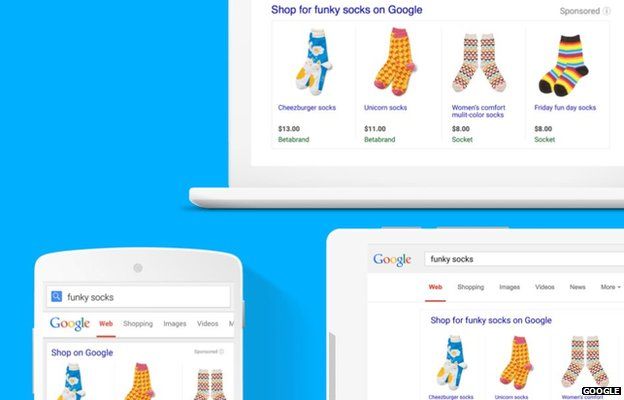Why is the EU gunning for Google?
- Published

The EU has focused its accusation on the placing of adverts from the Google Shopping service
The European Commission has formally accused Google of abusing its dominance in search and favouring some of its own services at the expense of rivals.
Google said it "strongly disagreed" with the commission's findings.
The "statement of objections" issued by the commission comes after a five-year investigation into Google and how it operates.
BBC News looks at how the investigation and settlement might play out.
When did the investigation start?
Google often places its own Shopping adverts above links to others platforms
The initial complaints from rivals were lodged with the commission in 2009.
However, many of the companies that complained said they had been adversely affected by Google's search algorithms for years beforehand. A formal investigation began in 2010.
The initial complaints were all about comparison shopping - ie looking for the best price for goods across different websites.
The commission alleges that when people do a shopping search, the results they get back are weighted towards Google's services even if those results are not the most relevant.
Competition commissioner Margrethe Vestager said the matter could set a precedent for the way it judged other complaints about Google.
The watchdog said she was also considering investigating Google's conduct when people searched for hotels and flights, and got maps in their results.
The commission has also received complaints about how Google scrapes websites and uses the content it finds and on how it works with its advertising partners.
Ms Vestager also announced her team had launched a separate investigation into Google's mobile operating system Android.
She said the commission was concerned that Google was abusing its dominance in the smartphone and tablet market to give its own services, such as search, more prominence.
What's happened in the past five years?
Google also features its Shopping service results prominently on searches carried out by phone
The commission has tried three times to settle the investigation since it began.
The first two attempts at settlement collapsed after complainants said the sanctions and changes they required did not go far enough.
The third time round, Google proposed giving prominence to rivals in its results. But this too was rejected late in 2014 following a very negative response from its rivals.
This rejection led the commission to reopen its investigation and formally accuse Google of anti-trust breaches.
What happens next?
Ms Vestager has said she will consider Google's response before deciding how to proceed
Google has got 10 weeks to respond to the accusations levelled at it.
During this time it can inspect the records the commission compiled to reach its conclusions and seek clarification about what exactly it is being accused of.
Once Google has responded, the commission will consider how to react.
Ms Vestager was keen to say that the outcome of the investigation had not been decided.
However, she did also not rule out fining Google if the commission was not convinced by its explanations.
What sanctions can be imposed on Google?
Google was founded in 1998 by Sergey Brin and Larry Page
European laws allow fines up to 10% of a company's annual revenue to be levied.
In Google's case this would amount to a fine of about $6bn (£4bn), based on last year's earnings.
However, it is unlikely that such a huge payment would be required.
The largest single fine levied on a company was against Intel in 2009 when it was asked to pay €1.06bn ($1.1bn; £700m).
Some companies have paid more.
For instance, during the long-running anti-trust investigation against Microsoft, fines totalling more than €2.2bn were imposed.
Any fine is likely to be accompanied by demands for sweeping changes to the way Google presents search results. Officials will be appointed to ensure that Google complies, and further fines could be imposed if it strays from the agreements.
Five years is a long time in internet history. Does it still matter after all this time?
The EU's previous investigations into Microsoft proved a headache for its leaders
The commission certainly thinks so. There is no doubt that Google is still dominant in Europe when it comes to search.
Ms Vestager said about 90% of all searches done in Europe were handled by Google. That statistic has remained largely static over the past five years.
This makes it different to the investigation the commission carried out into how Microsoft favoured its Internet Explorer browser.
Over the many years of that investigation, IE lost market share and, by the time a settlement was reached, it was no longer dominant.
It is unlikely that Google's market share will shrink to the same extent over the next few years.
However, its share might shrink thanks to deals that put the search engines of rivals in key places. Yahoo has signed a deal with Mozilla, and Microsoft is moving to use Bing across desktops laptops, phones and consoles.
In addition, Google's deal to put its search engine into Apple's Safari is due to expire this year. Rivals are keen to replace it.
Would a fine and a settlement end the commission's investigation?
Google's bundling of apps and services for Android is under investigation
No. The commission has received complaints about many different parts of Google's sprawling empire.
Ms Vestager said the investigation into Android was aimed at finding out if it too favoured Google's other services.
In addition, she said she wanted to look at whether Google was doing enough to encourage others to make their own versions of Android.
Meanwhile, Russia's Federal Antimonopoly Service recently announced it too was looking into complaints about the terms Google insists Android device makers follow.
Rory Cellan-Jones explains why Google's competitors want changes to its search results
- Published15 April 2015
- Published15 April 2015
- Published18 February 2015